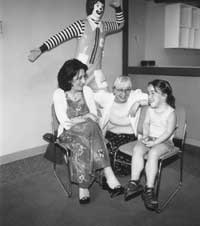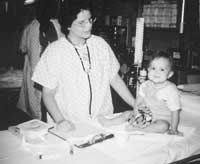
"Most
kids with
chronic illness are not
going to get well.
Their disease is
going to follow them
into adulthood,
and they're going
to have to be able
to manage it
by themselves.
Otherwise, they're never
going to become
fully independent.
The question is
how do we help them
do that?"
—Dr. Annette Frauman, associate professor and interim associate dean,
Nell Hodgson Woodruff School of Nursing

Dr. Annette Frauman (center) and research assistant Dr. Nina Babat are working with young ESRD patients like Criston Mundy to understand why they face more difficulties on the road to self-reliance. Criston is doing well several years after a kidney transplant at Children's Healthcare of Atlanta at Egleston.

Dr. Robert Fennell established the Southeast's first pediatric dialysis unit at the University of Flordia. Dr. Frauman was a member of that team.

Cyrena Gilman is collaborating with Dr. Frauman by interviewing ESRD patients at Riley Hospital for Children in Indianapolis. The nursing researchers first worked together at Shands Hospital in Florida.
"We
want these kids
to grow up normally,
but it's a tricky business.
Teenagers by definition
perceive themselves
as immortal.
When they come to
the realization that
‘chronic' means ‘forever,'
they think, ‘Wait,
I didn't sign up for this.' "
—Pediatric nurse Cyrena Gilman, Riley Hospital for Children
By Pam Auchmutey
Growing up is never easy, and the prospects are much tougher for children with chronic illness. Even on good days, conditions such as diabetes or asthma can dampen childhood enthusiasm for school, work, play, family, and friends. Annette Frauman, PhD, RN, FAAN, an experienced pediatric and public health nurse, is in constant search of ways to keep these children on track for a healthy and happy life.
"Most kids with chronic illness are not going to get well," says Frauman, associate professor and interim associate dean in the Nell Hodgson Woodruff School of Nursing. "Their disease is going to follow them into adulthood, and they're going to have to be able to manage it. Otherwise, they're never going to become fully independent. The question is how do we help them do that?"
The challenge Frauman describes has fascinated her for more than 25 years. She has pursued her interest in the social and adaptive development of chronically ill children by studying their level of self-reliance and their ability to manage daily tasks from making a bed and budgeting their allowance to going out on a date. Most of her research has focused on children with end-stage renal disease (ESRD) as they cope with the regimen of pediatric dialysis or the aftereffects of organ transplant. ESRD requires a delicate balance of medication, diet, rest, and sensible physical activity for adult and pediatric patients alike. Because there are fewer cases among children up to age 19 (13 per million) than adults (255 per million), it's often more difficult for researchers like Frauman to find willing study participants.
Prior research has shown that children with ESRD may experience subtle neurological effects such as difficulty in memorizing and recalling simple number sequences. Many don't achieve independence as easily as healthy children or those with juvenile diabetes. Study results from Europe and Australia indicate that children with ESRD tend to live at home longer or indefinitely. They may not finish school or find a job.
"We don't really know the major reasons why these kids don't become independent," Frauman says. "If it's the illness, then we need better management of the illness. If it's keeping kids in school, keeping them involved with other kids, that requires a different set of interventions. And if it's closely related to their neurological abilities, we need interventions that are cognitively directed. We don't know which or which combination of those things may be responsible."
To help understand this, Frauman is leading a year-old study of patients at Children's Healthcare of Atlanta at Egleston, Riley Hospital for Children at the University of Indiana, and Shands Hospital at the University of Florida (UF). Frauman and her long-distance colleagues are testing the influences on cognitive, social, and adaptive development of young transplant and peritoneal dialysis patients by interviewing the children and one parent and by looking at the course of each child's illness in relation to how well they function at school and at home. The study will involve a total of 120 children, ages 6 to 17, at all three sites. Once completed, the researchers hope to develop a scientifically based set of interventions so that nurses and physicians can better instruct children on managing their illness and set them on the path toward independent adulthood.
Knowing the score
Frauman has turned to her colleagues at Riley and Shands before to observe how well kids thrive on peritoneal dialysis or after transplant surgery. Her current research builds on a small descriptive study she co-led at Riley Hospital in the early 1990s while on the nursing faculty at the University of North Carolina (UNC) at Chapel Hill. Frauman published those results in the October 1996 American Nephrology Nursing Journal (ANNJ), not long before joining the School of Nursing at Emory in 1996. The 37 patients (ages 5 to 20) in the Riley Hospital study had received at least one kidney transplant, and some had resumed dialysis after their transplant failed. In this case, Frauman wanted to know if the level of development differed for children with and without a functioning transplant.
"We found that the percentile scores were very low (20s versus 90s for healthy children) for all of the kids. The scores did not differ with or without a functioning kidney, which argues that the cause is the chronicity and not the illness," Frauman explains. "The kids on dialysis were arguably sicker, yet their social and adaptive development scores were essentially the same as for children with a functioning kidney."
To perform the study, research assistants conducted telephone interviews with each child and a parent and also attained scores using an instrument known as the Vineland Adaptive Behavior Scales. Given to parents, the oral and written questionnaire measured their child's level of communication (oral and written), living skills (self-reliance and the ability to perform daily tasks), and socialization (individuals and groups). Frauman and her co-investigators at Riley and UNC also measured school or work attendance, according to age, and participation in after-school and community activities to determine each child's rehabilitation status. While involvement in school or work was considered strong, only 48% of the children regularly participated in social and recreational activities such as singing, sports, camp, scouting, band, clubs, and dancing. The larger question was, Why?
"Renal transplantation is often considered to be a 'cure' by nurses and other health professionals, as well as by children and parents," wrote Frauman in her 1996 ANNJ article. "After successful transplantation, the assumption is that children with renal failure will be much like other children. The results of this study provide some evidence that this may not always be the case."
She also noted some parallels with research by other experts. Her findings were consistent with a 1978 study that suggested that delays in social and adaptive behavior may occur over time and that improvements after transplantation may occur slowly or not all. Also consistent with her findings were reports published in 1990 by Robert Fennell, MD, her colleague at Shands Hospital, which showed a lack of improvement in cognitive function after transplantation. Frauman concluded that long-term study was needed to determine whether young patients catch up developmentally with their peers if their condition improves.
Implications for nursing
Quite often, chronic illnesses like ESRD leave children and parents with diminished expectations about what a child can do physically, mentally, and socially. Transplant patients often have great expectations for freedom only to discover there are still limitations. Nurses can help by regularly assessing their patients' social, cognitive, and motor development skills to identify problems early when they are easier to address. They can also provide tips such as planning rest periods before and after vigorous play or exercise and sticking to a low-fat diet—even away from the watchful eyes of parents.
"Through patient teaching, nurses can directly address any concerns, which benefits kids and parents tremendously," Frauman emphasizes. "Parents also must deal with the school system, which may be terrified at the thought that a child could die in the classroom. If we can develop a scientifically based intervention, then it has validity and is usable across parenting styles and in schools. The more we know, the more we can help."
She knows their struggles well. As a young public health nurse, Frauman managed a variety of children's cases in rural South Carolina. "That experience gave me a very broad view of the lives of young patients and their families as opposed to focusing on their illness or their periods of hospitalization," she recalls. "It was my job to help them get on with their lives."
Her career later took a different path at the University of Florida, where she studied, taught, and worked in the general pediatric unit at Shands Hospital. There she linked professionally with Fennell, the physician in charge of the unit, and with Cyrena Gilman, MN, RN, who would become her longtime partner in pediatric nursing. The cornerstone of their partnership was laid in 1973 when Congress passed legislation stipulating that Medicare cover the enormous medical costs for ESRD patients. After securing a grant, Fennell's team opened the first pediatric dialysis unit in the Southeast in 1975. In no time, patients began rotating in and out of the two-bed unit at Shands.
"The kids in the dialysis unit would come in regularly, but they had lives somewhere else," Frauman recalls. "Once they received their transplant, they went home. But you still had to deal with the same kinds of problems I dealt with as a public health nurse—counseling families about their child's condition, getting the kids back into school, scheduling their clinic appointments, and getting them into well-child care."
Frauman's passion for helping young ESRD patients did not diminish when she left UF to join the nursing faculty at UNC, nor did Gilman's, when she joined Riley Hospital in Indianapolis. Their paths have converged many times since and also with Fennell, who is a co-investigator with both nurses in Frauman's current study. Despite the distance of their working relationship, all remain steadfast in their purpose.
"We want to help children buy into taking responsibility for managing their disease," says Fennell, a professor of pediatrics at UF. "These kids face a lot of challenges, including time out from school, and their daily routine is interrupted by frequent hospitalization. They're experiencing these things at a time when they're also going through developmental stages of maturing and learning. We want to find better ways to inform and motivate them."
Gilman concurs. "We want these kids to grow up normally, but it's a tricky business. Teenagers by definition perceive themselves as immortal. When they come to the realization that 'chronic' means 'forever,' they think, 'Wait, I didn't sign up for this.' We're finding that kids who treat ESRD as another body maintenance routine do well as opposed to kids who think they have a mountain to climb."
And while they may not think it, children with ESRD do have an advantage. Because their condition is chronic, nurses, physicians, and parents can teach them how to stay healthy before and after kidney dialysis or transplantation. "There's nothing easy about being a sick child or the parents of a sick child," Frauman says. "If I can make that better as a nurse or as a researcher, that's what I want to do. I've discovered something that I want to share with others to make kids' lives better."
 From
Pink Lady to Postdoc
From
Pink Lady to Postdoc